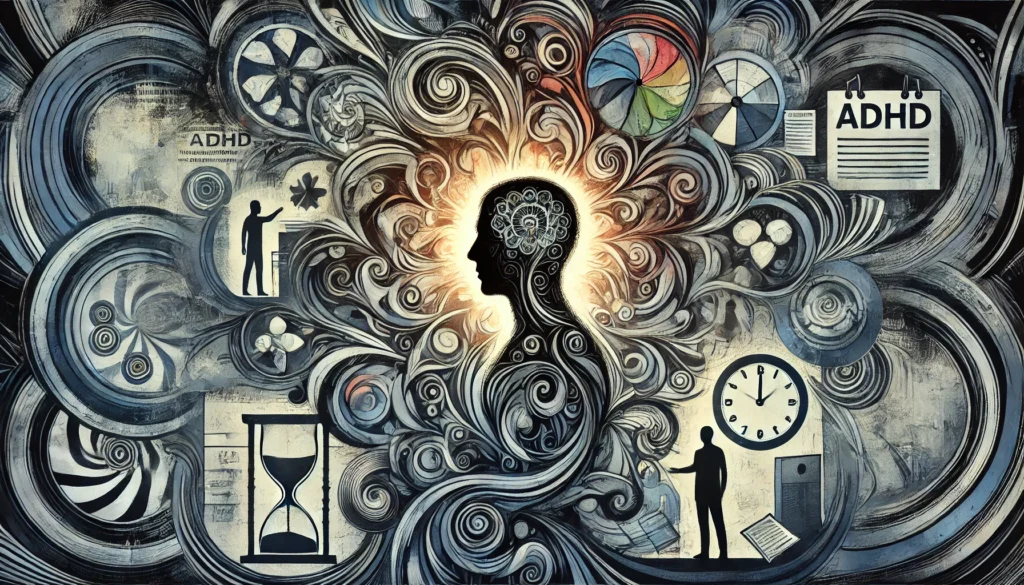Attention Deficit Hyperactivity Disorder (ADHD) is more than just a childhood condition—it’s a complex, lifelong neurological disorder that can significantly impact daily life. Understanding ADHD and its complications is crucial for those affected by it, as well as for health and wellness professionals, educators, and families. This article explores the intricacies of ADHD, detailing its complications, associated disorders, and the negative effects it can have on individuals.
You may also like: Enhancing Concentration: Strategies for ADHD
Understanding ADHD: A Brief Overview
ADHD is characterized by patterns of inattention, hyperactivity, and impulsivity. These symptoms can interfere with functioning or development, leading to challenges in various aspects of life, including work, school, and personal relationships. ADHD is typically diagnosed in childhood, but its effects often persist into adulthood.
Historical Context
The understanding of ADHD has evolved significantly over the years. Initially recognized as “minimal brain dysfunction” in the early 20th century, the disorder has undergone numerous redefinitions. It wasn’t until the 1980s that ADHD was acknowledged in its current form, reflecting a deeper understanding of its symptoms and impacts.
Early Recognitions and Misconceptions
In its early years, ADHD was often misunderstood, with many attributing its symptoms to lack of discipline or poor parenting. These misconceptions led to stigmatization and delayed interventions. Over time, research revealed the neurological basis of ADHD, shifting perceptions and opening pathways for better treatment options.
Evolution of Diagnostic Criteria
The diagnostic criteria for ADHD have been refined over the decades, with each revision of the Diagnostic and Statistical Manual of Mental Disorders (DSM) contributing to a more nuanced understanding. This evolution has allowed for more accurate diagnoses, acknowledging the diverse presentations of ADHD symptoms in different individuals.
Societal and Cultural Impacts
The societal perception of ADHD has varied globally, influenced by cultural beliefs about mental health and behavior. In some cultures, hyperactivity might be seen as normal childhood behavior, whereas in others, it might be pathologized. Understanding these cultural nuances is vital for accurate diagnosis and treatment.
Complications with ADHD
While ADHD itself presents challenges, its complications can exacerbate the difficulties faced by those with the disorder. These complications can affect various domains of life, from education to personal relationships.
Academic Challenges
Individuals with ADHD often struggle in academic settings due to difficulties with concentration, organization, and completing tasks. These challenges can lead to lower academic performance and increased dropout rates. The inability to focus or remain seated for extended periods can hinder learning and contribute to a frustrating educational experience.
Impact on Learning Styles
ADHD can significantly affect learning styles, making traditional classroom settings challenging for affected students. They may require more interactive and engaging teaching methods to maintain their attention. Educators need to be aware of these needs and adapt their strategies to support diverse learners.
Coping Mechanisms and Supports
Students with ADHD often develop coping mechanisms, such as using fidget tools or taking frequent breaks, to help manage their symptoms. Schools can support these strategies by implementing individualized education plans (IEPs) and providing accommodations like extra time on tests or assignments.
Long-term Educational Outcomes
The academic challenges associated with ADHD can have long-term impacts, influencing higher education opportunities and career choices. Early intervention and support are crucial to help students with ADHD reach their full potential and pursue their desired educational and career paths.
Occupational Difficulties
In the workplace, ADHD symptoms can result in difficulties with time management, task completion, and following instructions. These challenges can lead to job instability and underemployment. Moreover, individuals with ADHD may experience increased stress and anxiety related to their job performance, further impacting their occupational success.
Navigating Workplace Expectations
Employees with ADHD may struggle with meeting workplace expectations, particularly in environments that require strict adherence to schedules and deadlines. Flexible work arrangements and supportive managers can make a significant difference in their performance and job satisfaction.
Strategies for Success
Individuals with ADHD can benefit from using organizational tools, such as planners or digital reminders, to manage tasks and deadlines. Cognitive-behavioral strategies and professional coaching can also help develop time management and prioritization skills, enhancing workplace productivity.
Impact on Career Progression
ADHD can influence career progression, as impulsivity and inattention may be misinterpreted as lack of interest or commitment. Awareness and education within organizations can help create more inclusive work environments that recognize and accommodate the unique strengths of employees with ADHD.
Social and Relationship Issues
ADHD can also affect social interactions and relationships. Impulsivity and hyperactivity may lead to conflicts with peers or colleagues, while inattention can result in missed social cues or communication breakdowns. These factors can contribute to feelings of isolation or loneliness.
Building and Maintaining Relationships
Building and maintaining relationships can be challenging for individuals with ADHD, who may struggle with active listening and empathy. Social skills training and therapy can provide valuable tools for improving communication and understanding in personal and professional relationships.
Impact on Family Dynamics
ADHD can strain family dynamics, as the symptoms can lead to misunderstandings and frustration. Families can benefit from counseling and support groups to develop effective communication strategies and foster a supportive home environment.
Peer Relationships and Social Skills
Children and adolescents with ADHD often face difficulties in peer relationships, which can affect their social development and self-esteem. Encouraging participation in group activities and social skills programs can help improve their interactions and build lasting friendships.

Negative Effects of ADHD
The negative effects of ADHD extend beyond the primary symptoms, impacting mental health, physical health, and overall well-being.
Mental Health Concerns
ADHD is often associated with a range of mental health issues, including anxiety, depression, and mood disorders. The stress of managing ADHD symptoms can exacerbate these conditions, leading to a cycle of mental health challenges that require comprehensive care.
Anxiety and Depression
Individuals with ADHD are at a higher risk of developing anxiety and depression, due to the stress and frustration associated with managing their symptoms. These mental health concerns can further complicate the management of ADHD, necessitating integrated treatment approaches.
Mood Disorders and Emotional Regulation
ADHD can affect emotional regulation, leading to mood swings and irritability. Understanding and addressing these mood disorders is crucial for improving the quality of life for individuals with ADHD, who may benefit from therapies focused on emotional regulation skills.
The Importance of Integrated Care
An integrated approach to care that addresses both ADHD and its associated mental health challenges is essential. Collaboration between mental health professionals and ADHD specialists can provide comprehensive support and improve treatment outcomes.
Physical Health Implications
ADHD can also impact physical health. Studies suggest a correlation between ADHD and increased risk of injuries due to impulsivity. Additionally, individuals with ADHD may experience sleep disturbances, which can affect overall health and exacerbate ADHD symptoms.
Risk of Injuries and Accidents
Impulsivity associated with ADHD can lead to a higher risk of accidents and injuries, especially in children and adolescents. Educating individuals and families about safety strategies can help mitigate these risks and promote better awareness in potentially hazardous situations.
Sleep Disturbances and Their Effects
Sleep disturbances are common in individuals with ADHD, often resulting in fatigue and difficulty concentrating. Addressing sleep issues through behavioral interventions or, if necessary, medication, can improve both sleep quality and overall ADHD symptom management.
Long-term Health Risks
The long-term health risks associated with ADHD can include obesity, cardiovascular issues, and substance abuse. Early intervention and lifestyle modifications, such as regular physical activity and healthy eating, can help reduce these risks and improve overall well-being.
Quality of Life
The cumulative effects of ADHD on mental and physical health, academic and occupational performance, and social relationships can significantly impact an individual’s quality of life. Managing these effects requires a multifaceted approach that addresses both the symptoms and the associated challenges.
Holistic Approaches to Well-being
Holistic approaches that integrate physical, mental, and emotional well-being can enhance quality of life for individuals with ADHD. This includes mindfulness practices, exercise, and nutritional counseling, which together can support overall health and symptom management.
The Role of Support Systems
Support systems, including family, friends, and community resources, play a critical role in improving quality of life for those with ADHD. Encouraging open communication and understanding can foster a supportive network that empowers individuals to manage their symptoms effectively.
Measuring and Improving Life Satisfaction
Life satisfaction for individuals with ADHD can be improved through personalized interventions that address their specific challenges and strengths. Regular assessments and feedback can help individuals and their support teams identify areas for improvement and celebrate successes.
Disorders Associated with ADHD
ADHD rarely exists in isolation; it is often accompanied by other disorders, complicating diagnosis and treatment.
Comorbid Conditions
Common comorbid conditions include learning disabilities, anxiety disorders, depression, and conduct disorders. These conditions can complicate ADHD management, necessitating a comprehensive approach to treatment that addresses all aspects of an individual’s health.
Learning Disabilities and ADHD
Many individuals with ADHD also have learning disabilities, which can further impact academic performance. Specialized educational strategies and interventions can help address these learning challenges, enabling students to achieve their academic goals.
Anxiety and Mood Disorders
Anxiety and mood disorders are prevalent comorbid conditions in individuals with ADHD, requiring careful management to prevent exacerbation of symptoms. Combined treatment plans that address both ADHD and these mental health concerns can improve overall well-being.
Conduct and Behavioral Disorders
Conduct and behavioral disorders, such as oppositional defiant disorder (ODD), are often seen alongside ADHD. Addressing these disorders requires a comprehensive behavioral approach that includes family therapy, behavioral interventions, and consistent support.
The Importance of Accurate Diagnosis
Accurate diagnosis is crucial for effective management of ADHD and its associated disorders. Misdiagnosis or incomplete diagnosis can lead to ineffective treatment strategies, further complicating the individual’s life.
Diagnostic Challenges and Misunderstandings
Diagnosing ADHD and its comorbid conditions can be challenging due to overlapping symptoms and societal misconceptions. Accurate assessment by trained professionals is essential to differentiate between disorders and develop effective treatment plans.
The Role of Comprehensive Assessments
Comprehensive assessments, which include psychological evaluations, educational testing, and medical history, are vital in identifying the presence of comorbid conditions. These assessments guide the development of tailored interventions that address the unique needs of each individual.
Implications for Treatment and Support
Accurate diagnosis has significant implications for treatment and support, influencing the choice of therapies and interventions. An individualized approach that considers the full spectrum of an individual’s challenges and strengths is essential for successful management.

Current Trends and Future Implications
The understanding and treatment of ADHD continue to evolve, with current research focusing on more personalized treatment approaches and the role of genetics and neurobiology in ADHD.
Personalized Treatment Approaches
Advancements in technology and medicine are paving the way for more personalized ADHD treatment strategies. These approaches consider an individual’s unique genetic makeup, lifestyle, and environmental factors to tailor interventions that are most effective for them.
The Role of Genetics in Treatment
Genetic research is uncovering the biological underpinnings of ADHD, offering insights into personalized treatment options. Understanding genetic predispositions can help tailor pharmacological and behavioral interventions to each individual’s needs, improving treatment efficacy.
Technological Innovations in Management
Technological advancements, such as digital health tools and apps, are revolutionizing ADHD management. These innovations provide real-time monitoring and feedback, empowering individuals to track their symptoms and progress, and adjust strategies as needed.
Environmental and Lifestyle Considerations
Environmental and lifestyle factors, such as diet, exercise, and stress management, play a critical role in ADHD symptom management. Personalized treatment plans that incorporate these elements can enhance overall effectiveness and improve quality of life.
The Role of Neurobiology
Ongoing research into the neurobiological underpinnings of ADHD is shedding light on potential new treatments and interventions. Understanding the brain’s role in ADHD could lead to breakthroughs in pharmacological and behavioral therapies.
Advances in Neuroimaging
Neuroimaging techniques, such as MRI and fMRI, are providing valuable insights into the structural and functional differences in the brains of individuals with ADHD. These findings are informing the development of targeted therapies that address specific neurological pathways.
Neurofeedback and Behavioral Interventions
Neurofeedback, a technique that uses real-time brain activity monitoring to teach self-regulation, is emerging as a promising intervention for ADHD. Coupled with traditional behavioral therapies, neurofeedback can enhance self-awareness and symptom management.
Implications for Future Treatment
As our understanding of ADHD’s neurobiology expands, new treatment modalities that target specific brain functions and pathways are likely to emerge. These innovations hold the potential to improve treatment outcomes and offer more precise interventions for individuals with ADHD.
Future Directions
As our understanding of ADHD grows, so too does the potential for improved interventions and support systems. Future research may focus on early detection and intervention, strategies for managing comorbid conditions, and the development of more effective educational and occupational accommodations.
Early Detection and Intervention Strategies
Early detection and intervention are critical for mitigating the long-term impacts of ADHD. Research into early indicators and screening tools can help identify at-risk individuals and provide timely support, improving outcomes across the lifespan.
Integrating Technology and Education
Integrating technology into educational settings offers new opportunities for supporting students with ADHD. Adaptive learning platforms and digital tools can provide personalized learning experiences, enhancing engagement and academic success.
Enhancing Workplace Accommodations
Future efforts to improve workplace accommodations for individuals with ADHD may focus on creating more inclusive environments that recognize and leverage their unique strengths. Training and awareness programs can help employers support diverse workforces and foster innovation.

Practical Advice for Managing ADHD
For those living with ADHD, and those supporting them, practical strategies can help mitigate the challenges associated with the disorder.
Behavioral Strategies
Implementing structured routines, using organizational tools, and setting clear goals can help manage ADHD symptoms in daily life. Behavioral interventions can be particularly effective when combined with medication and therapy.
Establishing Routines and Habits
Creating consistent daily routines and habits can provide a sense of stability and predictability for individuals with ADHD. Simple strategies like setting regular sleep and meal times can help regulate behaviors and improve overall function.
Utilizing Organizational Tools
Organizational tools, such as planners, calendars, and digital apps, can aid in task management and reduce feelings of overwhelm. These tools help individuals prioritize tasks, set reminders, and track progress, enhancing productivity and efficiency.
Goal Setting and Achievement
Setting realistic and achievable goals is crucial for maintaining motivation and focus. Breaking larger tasks into smaller, manageable steps can make goals feel attainable and provide a sense of accomplishment, boosting self-esteem.
Professional Support
Seeking support from healthcare professionals, including psychologists, psychiatrists, and occupational therapists, can provide individuals with ADHD and their families with the tools and strategies needed to manage the disorder effectively.
The Role of Therapy
Therapies, such as cognitive-behavioral therapy (CBT) and counseling, offer valuable support for managing ADHD symptoms. These therapeutic approaches can help individuals develop coping strategies, improve emotional regulation, and enhance interpersonal skills.
Medication Management
Medication can be an effective component of ADHD treatment, helping to manage symptoms and improve daily functioning. Collaborating with healthcare providers to find the right medication and dosage is crucial for maximizing benefits and minimizing side effects.
Occupational and Speech Therapies
Occupational and speech therapies can address specific challenges associated with ADHD, such as fine motor skills and communication difficulties. These therapies provide targeted interventions that support overall development and improve quality of life.
Community and Educational Resources
Access to community resources, support groups, and educational programs can provide valuable support for individuals with ADHD and their families. These resources offer a sense of community, shared experiences, and practical advice for managing the disorder.
Support Groups and Networks
Support groups and networks provide a platform for individuals with ADHD and their families to connect, share experiences, and offer mutual support. These communities can reduce feelings of isolation and provide valuable insights into living with ADHD.
Educational Workshops and Programs
Educational workshops and programs offer opportunities for learning about ADHD and effective management strategies. These resources can empower individuals and families to advocate for their needs and access necessary support services.
Online Resources and Tools
The internet offers a wealth of resources and tools for managing ADHD, from informational websites to online forums and apps. These digital resources provide convenient access to information, support, and community, enhancing overall management efforts.
Conclusion
ADHD is a complex disorder with far-reaching implications for those affected by it. Understanding the complications and negative effects of ADHD is crucial for developing effective management strategies and improving quality of life. By staying informed about current trends and future directions in ADHD research and treatment, individuals, healthcare professionals, and educators can better support those living with this challenging disorder.
Further Reading:
Attention-Deficit/Hyperactivity Disorder (ADHD) in Adults
Other Concerns and Conditions with ADHD
ADHD – Symptoms, Types, Causes, Complications, and Treatment
Important Note: The information contained in this article is for general informational purposes only, and should not be construed as health or medical advice, nor is it intended to diagnose, prevent, treat, or cure any disease or health condition. Before embarking on any diet, fitness regimen, or program of nutritional supplementation, it is advisable to consult your healthcare professional in order to determine its safety and probable efficacy in terms of your individual state of health.
Regarding Nutritional Supplements Or Other Non-Prescription Health Products: If any nutritional supplements or other non-prescription health products are mentioned in the foregoing article, any claims or statements made about them have not been evaluated by the U.S. Food and Drug Administration, and such nutritional supplements or other health products are not intended to diagnose, treat, cure, or prevent any disease.


